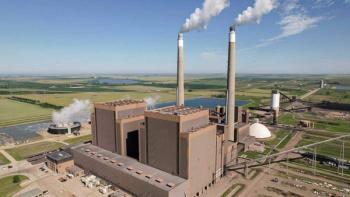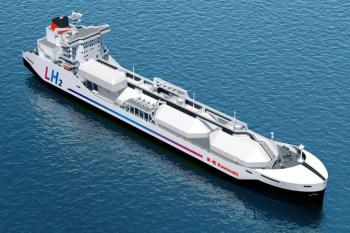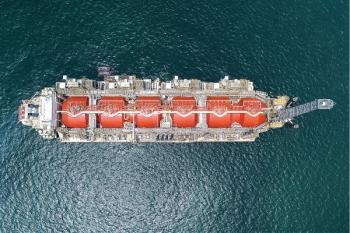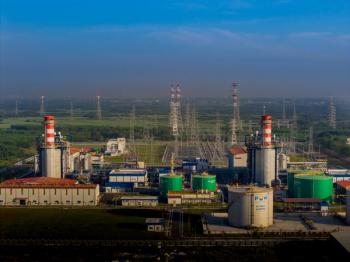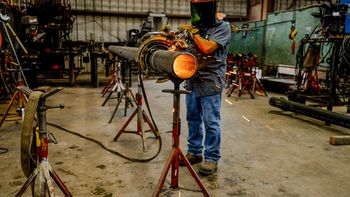
How important is gas turbine filtration efficiency?
Below are excerpts given from a paper presented at Power Gen International, 2014, by Dan Burch, Steve Hiner, Jim Lenox, Tim Nicholas, Sarah Propp, of CLARCOR Industrial Air.
"By analyzing sites globally, it can be demonstrated that other factors play just as much a role in compressor health as the efficiency of the filter does. The size of the inlet house, the metals or plastics used for filter casings, and the media selection has as much to do with turbine performance as the efficiency of the filter.
With the amount of air consumed by a gas turbine, the choice of inlet filters is one of the most critical to make. But how do you compare one filter to another? And most importantly, what is that filter’s effect on compressor health?
Perhaps the most common – and first evaluated – standard is filtration efficiency. But it’s time to focus on what is truly important – compressor health and the performance of your gas turbine. After all, just because a filter is rated a certain way, if your GT suffers performance, then the filter isn’t worth the rating anyway.
It’s time to also consider the evaluation of other factors when selecting a filter for an air inlet system. Filtration efficiencies measure how much of a specific dust and other particles a filter removes during a specified test, and is designed to give an estimate of filter life and effectiveness. But that devalues the impact that other factors of the filter play on the performance of your plant.
Size of your inlet house – How much air and moisture passes through? Depending on how large your inlet is, you may need to look at how the airflow can be treated along with what filters you are selecting. It’s possible to help improve compressor health by installing safeguards such as weather hoods, mist eliminators, moisture separators and coalescers that will reduce the amount of contaminated air and moisture that can make it to your final filter causing dirt wash through, to your compressor. Because these are separate stages within the inlet house, they would not be factored into any stand-alone filtration efficiency test.
- Metals or plastics used for filter casings – is there a benefit from stainless steel vs. galvanized? Do certain types of plastics hold up better?
Metals can be affected by corrosion from surrounding site conditions that can affect filter performance. Stainless steel provides a benefit in corrosive and coastal environments because the metal housing won’t degrade as quickly. If a filter has plastic housing the selection there is also important. Some plastics will become brittle and crack over time and some can creep which morphs the shape of the frame. Evaluate where your inlet system is located to make sure you have the correct filter selected for your site and the expected life of the filter product.
- Filter construction – What is the general quality and robustness of the final assembly?
Construction is also an important factor to consider. Self-cleaning filters typically have a spiral bead of glue that bonds the inner and outer mesh to the filter media. If this glue is improperly applied, it runs the risk of detaching from the filter and being ingested into the clean air path into the gas turbine. No matter what efficiency rating a filter has, if there is poor sealing either of the media within the frame of the filter, or of the filter frame to the filter house, then it won’t function as advertised. As with anything outdoors, filters won’t age well if they are not designed well. Look for filters that promote positive sealing and avoid air bypass issues, and you can positively influence compressor health without needing the highest efficiency filter.
- Media selection – Just because a filter achieves a higher rating doesn’t make it effective for all environments. As with tires on your car, certain types are made for certain conditions. It’s important to understand what the filter is made of. Some filters are tested only when dry. Burst strength when wet isn’t disclosed, meaning the media may not hold up as well. Glass fiber media requires a chemical binder to keep it together.
Some filters use water soluble binders, which break up over time when wet and cause filter failure. There are also medias available with a hydrophobic coating and some that leach water as soon as it is exposed. The use of nanofiber should also be known. Nanofibers can break over time, especially in self-cleaning elements when pulsed too often. This can lead to a reduced efficiency from the clean, advertised filter rating. Again, the filter rating won’t tell you any of this critical information that is crucial to maintaining a healthy compressor.
The amount of dust a filter can remove is only one part of a larger parcel of things to consider when selecting filters. And it doesn’t even contain some of the most important factors to consider: plant performance.
Compressor degradation, plant output, heat rate, differential pressure (dP): all key performance indicators for a power plant, and all factors that should be at the forefront when evaluating filters. What you get on paper is not necessarily what you get in the real world. A filter’s true rating is what you get when you evaluate plant performance vs. filter selection. Make sure to pull your plant data and look at how your output and heat rates performed with filters. Do you see dP spikes? Does the power output drop between water washes? Does power output drop significantly with the new filter?
These are the factors that are important. And these are the factors that make up compressor health. It’s tempting to just reach for the highest rated filter available. But that would be a mistake. When you try to remove absolutely every possible particle, there are consequences.
1. Corrosive vapors like sulfur dioxide (SO2) can still get through to the compressor and cause metal degradation.
2. The elimination of water washes, a touted benefit of EPA/HEPA filters, might actually make corrosion worse, as compressor blades are not getting regular cleanings.
EPA/HEPA filters are great at capturing all the dirt, dust and other particles that get sucked into an inlet house. Then the filters get wet with moisture, and all that dirt leaches through the filter anyway, negating any advantage the filter’s initial efficiency provided. Your compressor is getting dirty and damaged, and your plant performance is going down. That’s not the ideal way to achieve a healthy compressor."
Newsletter
Power your knowledge with the latest in turbine technology, engineering advances, and energy solutions—subscribe to Turbomachinery International today.

